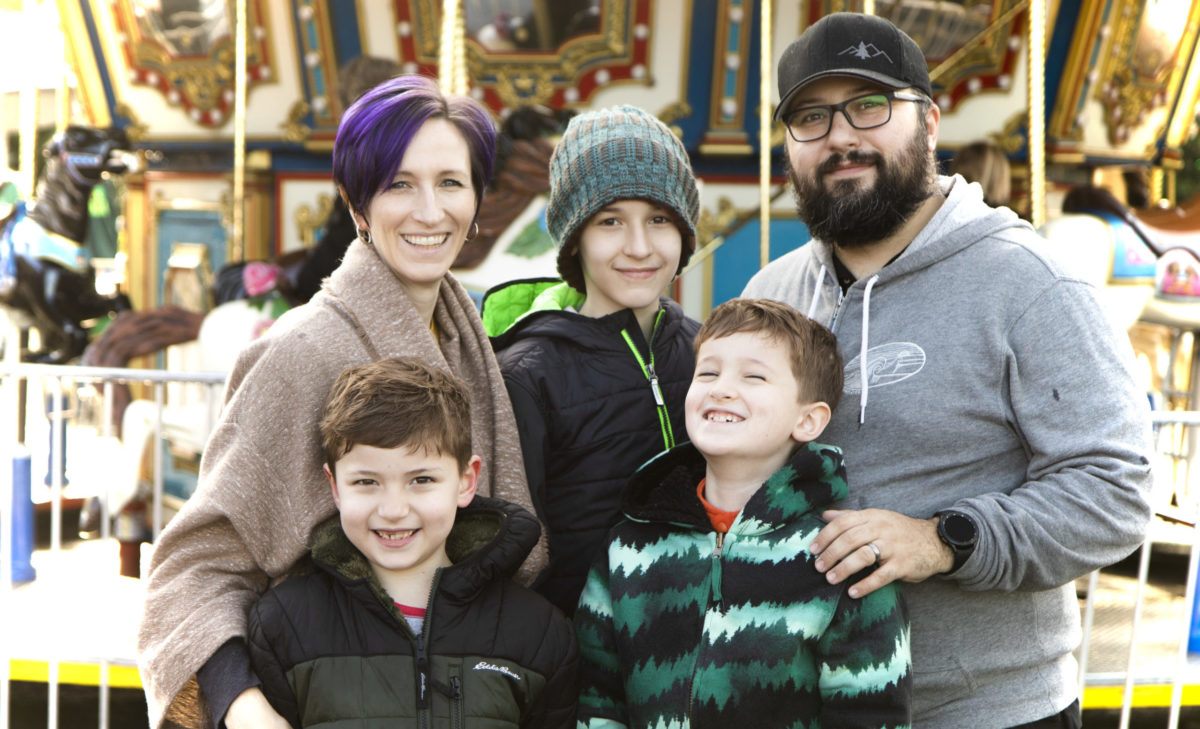A source for sharing stories of inclusion and belonging, bold activism and local change-makers in action.
The mission of this platform is to amplify diverse voices and “good news” stories from within the disability community in Snohomish County and across the region.
*The Arc Amplified is an online publication of The Arc of Snohomish County. Learn more about our mission and values at arcsno.org/about
Do you have a story of inclusion you want to share?
Are you leading local advocacy efforts? Has your family or loved one benefited from activities or programs in Snohomish County that are designed to advance community inclusion?
We want to know!
Send an email to:
Courtney Criss
Leadership & Advocacy Program Manager
Courtney@arcsno.org
or call (425) 258-2459 x 106.
FOREST BATHING
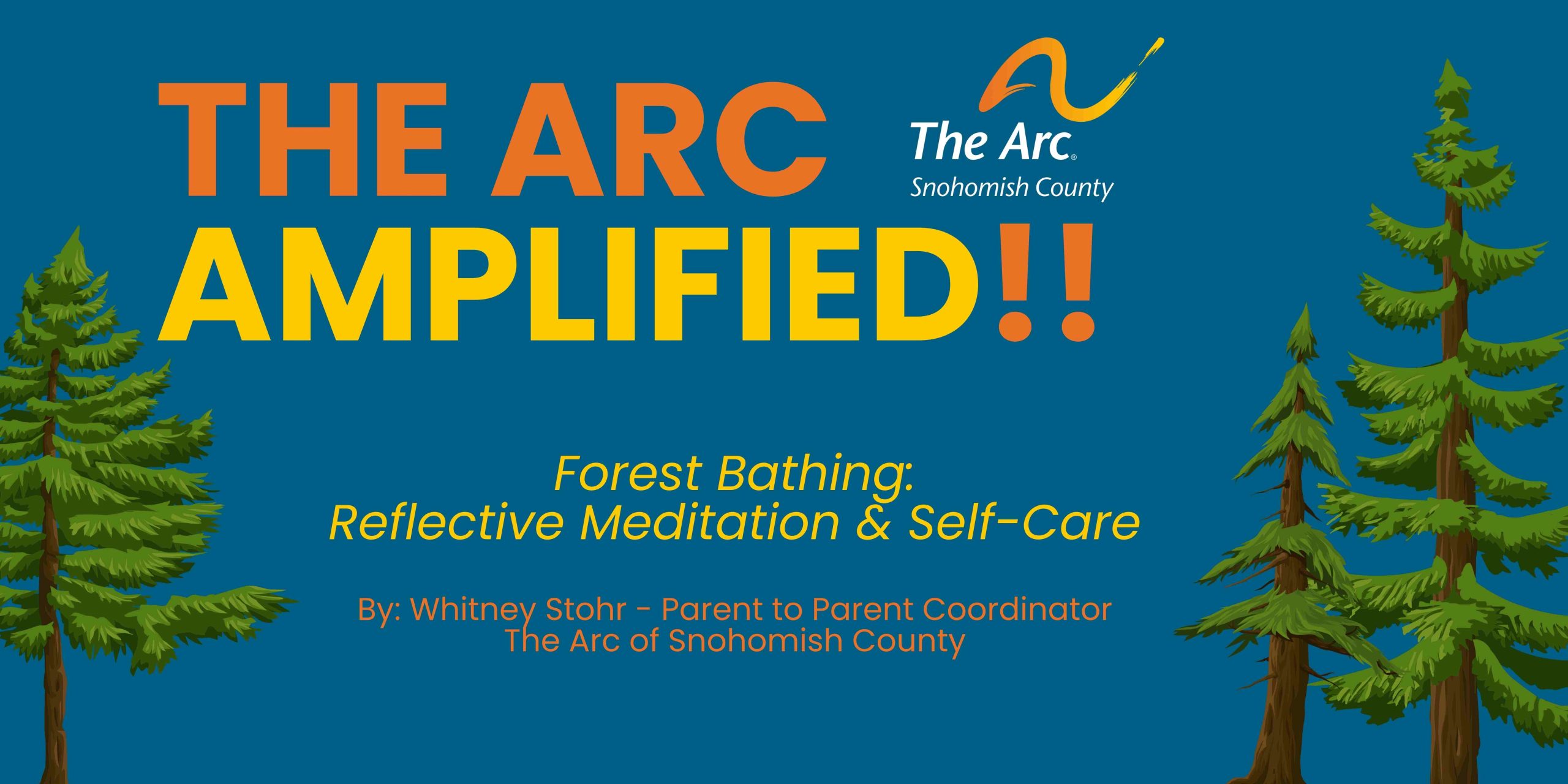
FOREST BATHING:
Reflective Meditation & Self-Care
Forest Bathing is a wellness activity that involves immersing oneself in nature while practicing intentional mindfulness.
Don’t worry! “Forest bathing” is probably NOT what you are envisioning at this moment. There is no bathtub and you will remain decently clothed throughout the practice.
The term forest bathing comes from the Japanese phrase shinrin-yoku: ‘shinrin’ translating to ‘forest,’ and ‘yoku’ to ‘bathing.’ Thus, this practice is about surrounding yourself, or “bathing” yourself, in the natural world.
The practice of forest bathing first came into popularity in Japan in the 1980s. The practice grew as a type of “eco-antidote” to an increasingly technology based world and economy. It encouraged people to reconnect with the natural world and protect the environment.
Simply being outdoors, enjoying and experiencing nature offers a multitude of benefits. However, forest bathing is about more than simply going outside. Forest bathing involves an additional meditative, or reflective, element. It is about practicing mindfulness with nature as a conduit. (Click here for an account of Forest Bathing by The Seattle Times.)
In the 1990s, researchers began studying the physical, mental and emotional benefits of forest bathing. As a self-care and mindfulness strategy, forest bathing encourages practitioners to relax their minds. It can reduce stress and mitigate burnout. It may support heart and lung health and increase focus, concentration and memory. It may also help boost immunity and support other areas of health and wellness. (Click here to read more about the benefits of Forest Bathing in this article by NPR.)
You can engage in forest bathing in any natural environment. It is easy and accessible and can be incorporated into your daily walk or when you are waiting for the kids between appointments or after school. Here is how you get started:
1. Find a space in nature and bring your focus to the present moment.
2. Begin walking, slowly and without purpose. Let your mind and body guide you as you focus your senses on the things around you that bring you peace. (You can also engage in forest bathing from a seated or stationary position.)
3. Take your time and spend as long as you need surrounded by nature in order to feel a sense of calm, renewal and happiness.
That’s it!
Want to learn more? The UW Washington Park Arboretum offers resources for Self-Guided Forest Bathing, including a 10-minute, guided audio meditation and a campus-based forest bathing map, with pinpointed locations on the UW Seattle, Bothell and Tacoma campuses.
Friends of North Creek Forest in Bothell hosts community Forest Bathing sessions on a monthly basis. (Click here for a video about Forest Bathing sessions at North Creek Forest.) Learn more at friendsnorthcreekforest.org.
Cascadia Forest Therapy is another local organization that offers support and resources for forest bathing, as well as guided public sessions. Learn more at cascadiaforesttherapy.com/public-sessions.
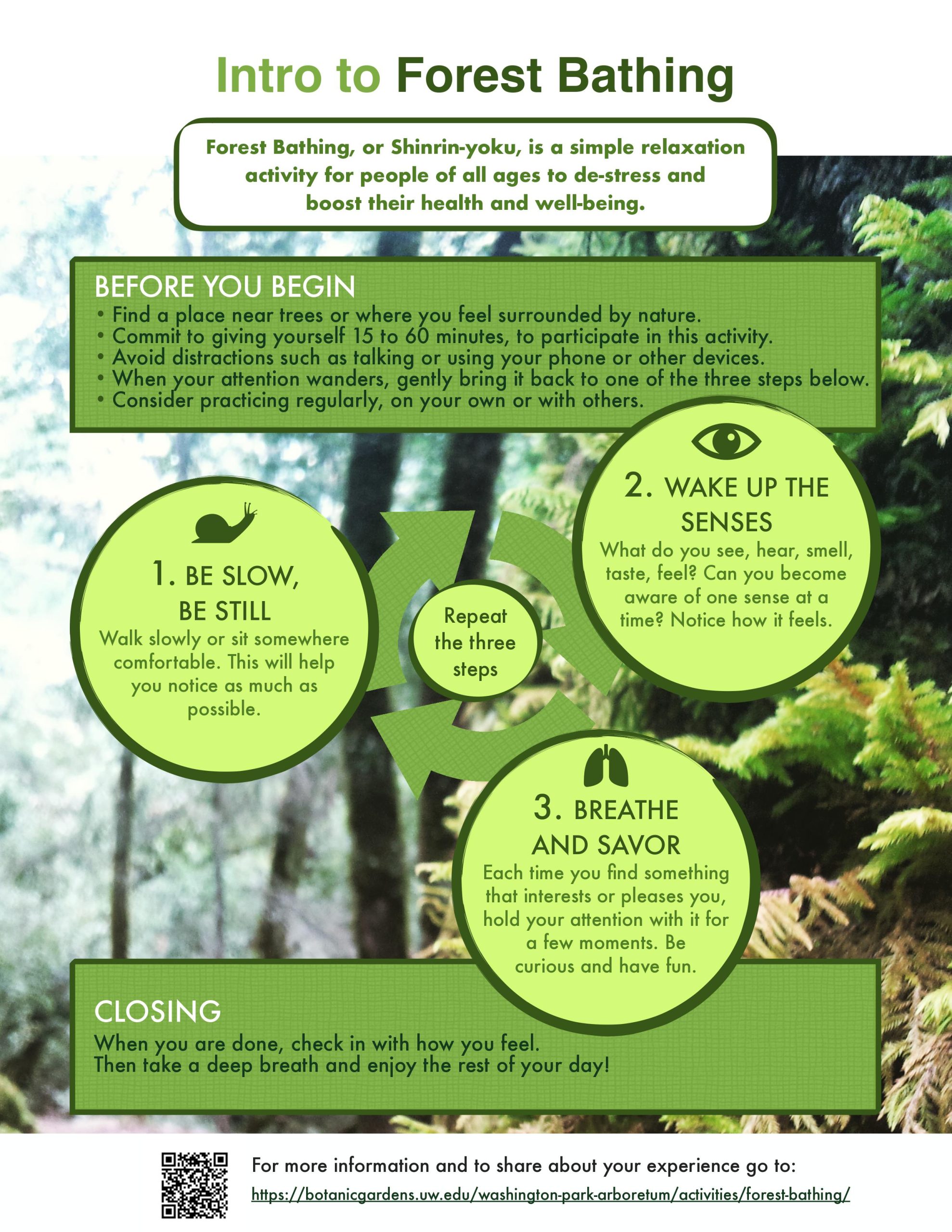
**********
An Invitation: Explore various self-care strategies and practices and engage in supportive discussion with other parents and family caregivers at monthly meetings of the Caregiver Connections support group, on the 3rd Tuesday of each month, from 7 PM to 8 PM, on Zoom. For more information, email whitney@arcsno.org.
**********
Whitney Stohr is a Parent to Parent Coordinator at The Arc of Snohomish County. She is passionate about advocating for medically complex children and children with disabilities and their families. She is a mom and medical caregiver herself, who is energized by working closely with other parent/family caregivers. She lives with her four-year-old son Malachi and husband Jason in Lynnwood. Connect with her on Instagram @rollin.w.spinabifida. Contact: whitney@arcsno.org.
Women’s History Month

Women’s History Month:
5 Disability Activists You Should Know
March is recognized as Women’s History Month.
While we should work with intention to recognize and celebrate the phenomenal achievements of extraordinary women during each and every month of the year, this month, in particular, we celebrate and uplift our sisters everywhere, who strive to break barriers, defy conventional norms and push the boundaries of our time. We honor them, and we celebrate all who have followed, and will follow, their example.
Here are FIVE Disabled women activists you should know and follow!
JUDY HEUMANN
Judy Heumann is an internationally recognized, disability rights activist, who has spent her life fighting for equity, access and inclusion in both the United States and abroad. Born in 1947, Judy acquired her life-long disability after contracting Polio at 18 months old. As a child, her family fought for access to public schools at a time before Federal law prohibited the exclusion of students based on disability. After graduating from college, Judy sued the New York Board of Education when they denied her a teaching license because of her disability, and she subsequently became the first wheelchair user to teach in New York City. Her continued activism around accessibility was featured in the 2020 documentary Crip Camp: A Disability Revolution. In the 1980s, she co-founded the World Institute on Disability. She later served as Assistant Secretary of the Office of Special Education at the US Department of Education during the Clinton Administration; as the first Advisor on Disability and Development at the World Bank; the Special Advisor on International Disability Rights for the US State Department, a position appointed by then-President Barack Obama; and a Senior Fellow at the Ford Foundation.
Learn more:
- Website: com
- Autobiography: Being Heumann: An Unrepentant Memoir of a Disability Rights Activist
- Podcast: The Heumann Perspective Podcast
ALICE WONG
Alice Wong is a Disabled activist, writer and media maker, and founder of the Disability Visibility Project, an online community that centers disability media and culture and serves as a repository of oral histories of people with disabilities. Born with spinal muscular atrophy in 1974, Alice has long been involved in disability activism. As an Asian American woman, she offers an important intersectional perspective. Her work has been published widely across media channels. She is a co-partner with #CripTheVote, an online engagement platform that encourages people with disabilities to vote and engage in the political arena. In 2013, President Obama appointed Alice to serve as a member of the National Council on Disability, an independent federal agency that advises Congress, the President and Executive Branch agencies on policies and programs that impact the disability community. She has received numerous awards and was named a Disability Futures Fellow by the Ford Foundation and the Andrew W. Mellon Foundation. In 2020, she was named one of BBC’s 100 Women.
Learn more:
- Website: com
- Book: Disability Visibility: First-Person Stories from the Twenty-First Century (There is also an edition adapted for young adult readers – Find it here!)
- Autobiography: Year of the Tiger: An Activist’s Life
- Twitter: @SFdirewolf and @DisVisibility
IMANI BARBARIN
Imani Barbarin is a disability activist, public speaker and communications professional, who writes from the perspective of her lens as a Black woman with Cerebral Palsy. She is the current Director of Communications and Outreach at Disability Rights Pennsylvania and has grown a large following through her blog Crutches and Spice and social media advocacy. (CLICK HERE to read more about how Imani has leveraged the power of social media to amplify her voice as a community activist.)
Learn more:
- Blog: Crutches and Spice
- Twitter: @imani_barbarin
- TicTok: //www.tiktok.com/@crutches_and_spice“>@crutches_and_spice
REBECCA COKLEY
Rebecca Cokley is a “2nd generation, civil rights activist” and the current U.S. Disability Rights Program Officer at the Ford Foundation. Previously, she was Founding Director of the Disability Justice Initiative at the Center for American Progress and, during the Obama Administration, she served as Executive Director of the National Council on Disability. Born in 1978 with achondroplasia, Rebecca was raised in the Bay Area by two activist parents who shared her disability. In 2015, she was inducted into the inaugural Susan M. Daniels Disability Mentoring Hall of Fame.
Learn more:
- Website: rebecca-cokley.medium.com
- Twitter: @RebeccaCokley
ANDRAÉA LaVANT
Andraéa LaVant is a Black, disabled woman activist, cultural changemaker and disability inclusion expert. As founder of LaVant Consulting, Inc., a social impact communications firm specializing in disability representation, Andraéa is a successful business woman and was the first visibly disabled Black woman to attend the Oscars for her work as Impact Producer of the award-winning, Netflix documentary Crip Camp. As an activist and influencer, she sits at the intersection of disability, race and gender, and is outspoken about representation and the inclusion of diversity within advocacy. In 2021, she was inducted into the Susan M. Daniels Disability Mentoring Hall of Fame.
Learn more:
- Website: com
- Twitter: @andraealavant
**********
Whitney Stohr is a Parent to Parent Coordinator at The Arc of Snohomish County. She is passionate about advocating for medically complex children and children with disabilities and their families. She is a mom and medical caregiver herself, who is energized by working closely with other parent/family caregivers. She lives with her four-year-old son Malachi and husband Jason in Lynnwood. Connect with her on Instagram @rollin.w.spinabifida. Contact: whitney@arcsno.org.
Breaking Ground on a New Inclusive Playground
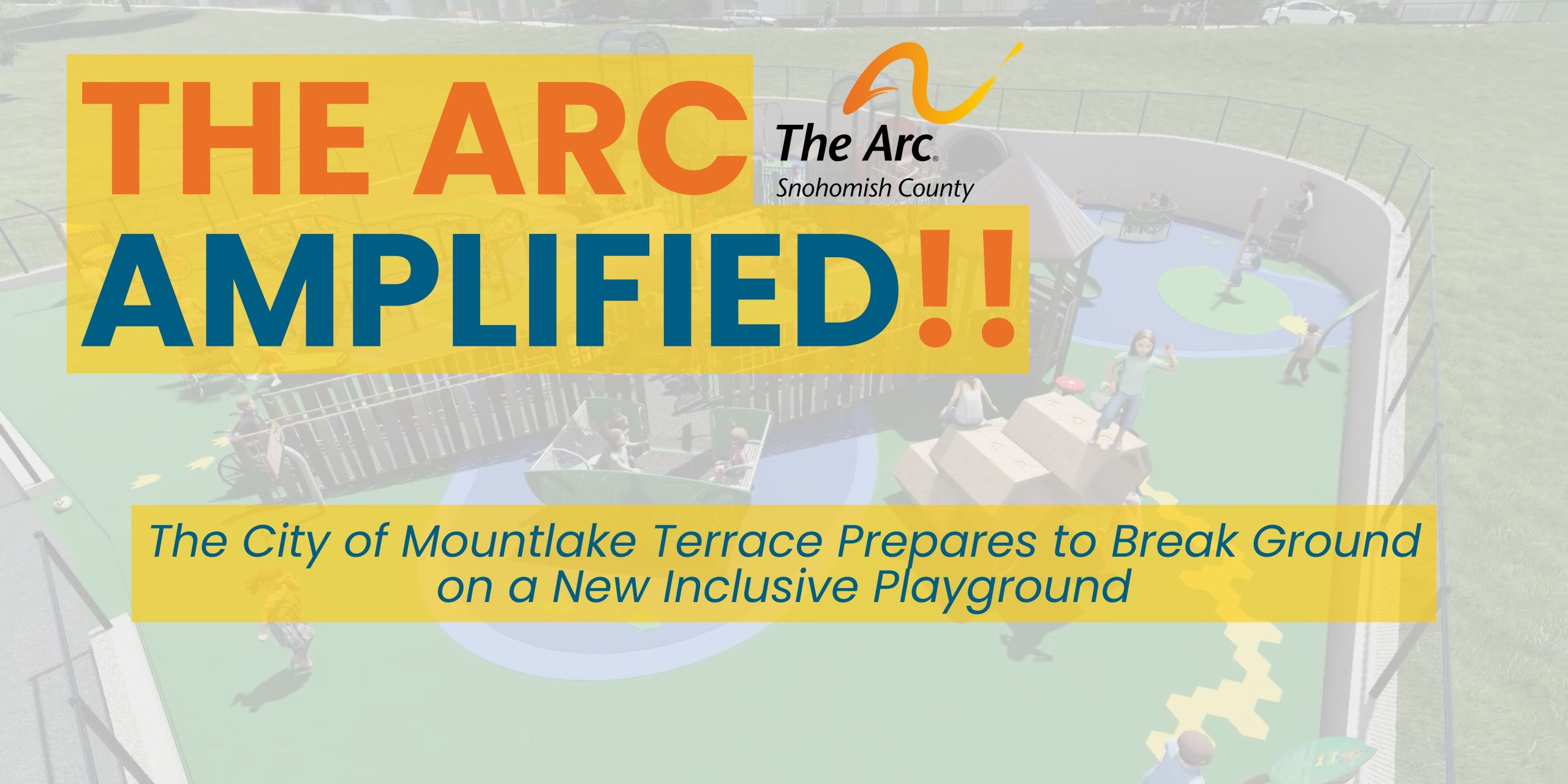
The City of Mountlake Terrace Prepares to Break Ground on a New Inclusive Playground
The City of Mountlake Terrace is preparing to break ground on a new playground at Ballinger Park. The playground is intended to provide an accessible and inclusive play space for all kids and families.
In a recent Facebook post, the City shared that construction on the playground is scheduled to begin this summer! It will be the first inclusive playground in Mountlake Terrace and one of only a few such park facilities in Snohomish County.
Special Olympics Washington
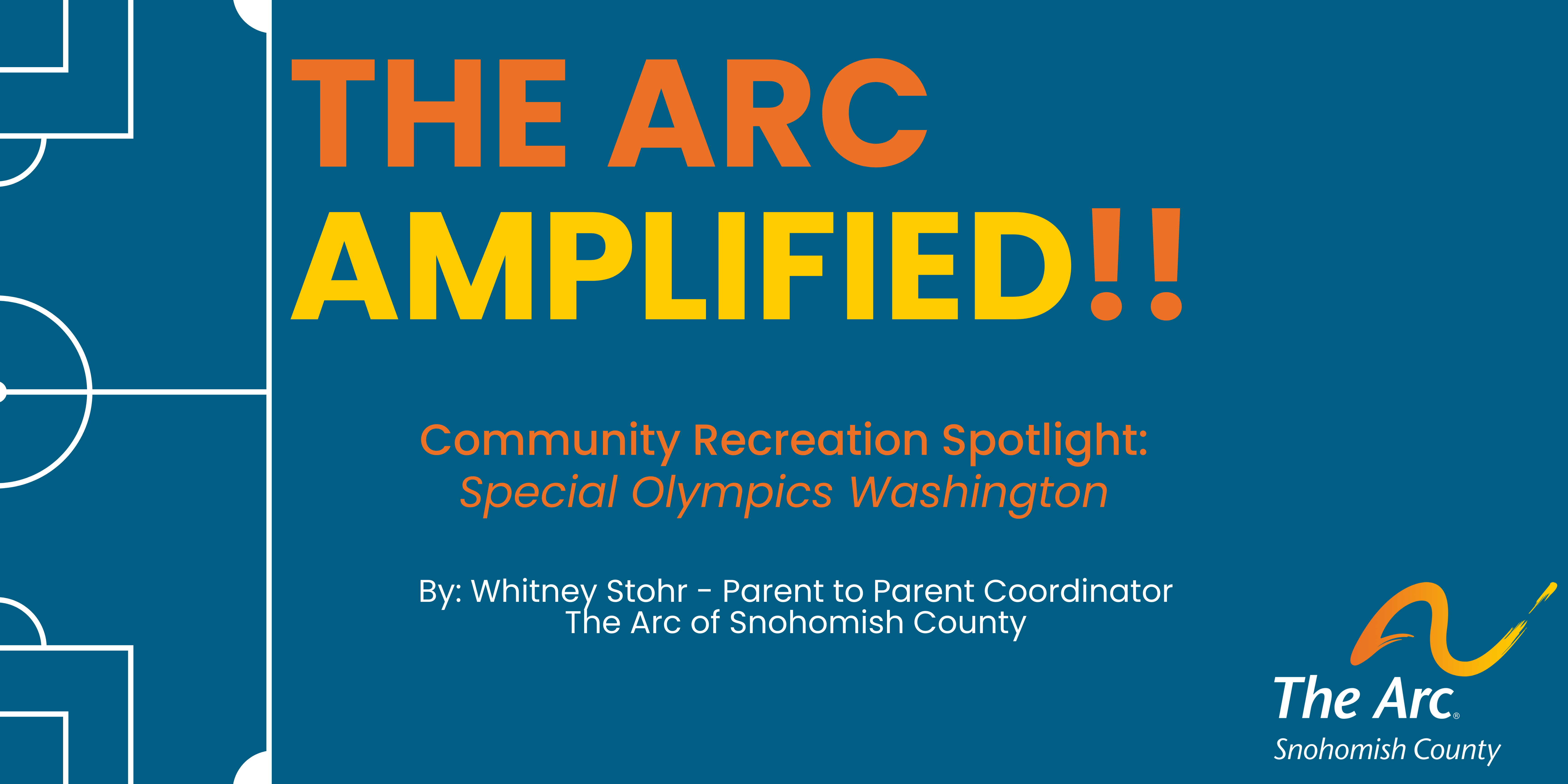
Community Recreation Spotlight:
Special Olympics Washington
The opportunity to participate in sports and recreational activities is important for everyone.
Details related to the “where,” “what” and “how” of our participation in sports and recreation may vary, but regardless of where we find our best fit, the benefits of recreation abound. Physical activity can improve both our health and wellness, and provide other, more intangible benefits such as peer connection and friendships, community engagement and the development of leadership skills.
Special Olympics is a non-profit organization with a global impact. Founded in 1968 by Eunice Kennedy Shriver to provide recreational and sporting opportunities for individuals with developmental disabilities, the program has expanded to support over 5.7 million athletes worldwide in some 200 countries and jurisdictions. (Click here to read more about the history of Special Olympics.)
In our state, over 19,500 athletes take part in programs offered by Special Olympics Washington. Youth can begin training and competing in Special Olympic activities at age eight. (There is no upper age limit for athlete eligibility). These athletes are supported in their programs by more than 10,000 volunteers, who serve as coaches and game officials, fundraisers and event staff.
Snohomish County is part of the Cascade Division of Special Olympics Washington. Depending on the season, sports opportunities may include: Alpine skiing, Athletics (a Track-and-Field based program), Basketball, Bowling, Powerlifting, Snowboarding, Soccer, Softball, Swimming and Volleyball. To learn more about sporting opportunities in Snohomish County, contact CascadeAD@sowa.org.
**********
LOCAL OPPORTUNITIES — SPRING 2022
**********
Whitney Stohr is a Parent to Parent Coordinator at The Arc of Snohomish County. She is passionate about advocating for medically complex children and children with disabilities and their families. She is a mom and medical caregiver herself, who is energized by working closely with other parent/family caregivers. She lives with her four-year-old son Malachi and husband Jason in Lynnwood. Connect with her on Instagram @rollin.w.spinabifida. Contact: whitney@arcsno.org.
All Are Welcome

READ-ALOUD: All Are Welcome
Pencils sharpened in their case. Bells are ringing, let’s make haste. School’s beginning, dreams to chase. All are welcome here.
Follow a group of children through a day in their school, where everyone is welcomed with open arms no matter their race, religion, or background. A #1 New York Times bestselling picture book celebrating kindness, inclusivity, and diversity.
Join Whitney Stohr, Parent to Parent Coordinator at The Arc of Snohomish County, as she reads: All Are Welcome, written by Alexandra Penfold and illustrated by Suzanne Kaufman (published 2018 by Alfred A. Knopf / Random House Children’s Books, New York).
Celebrating the Retirement of Executive Director
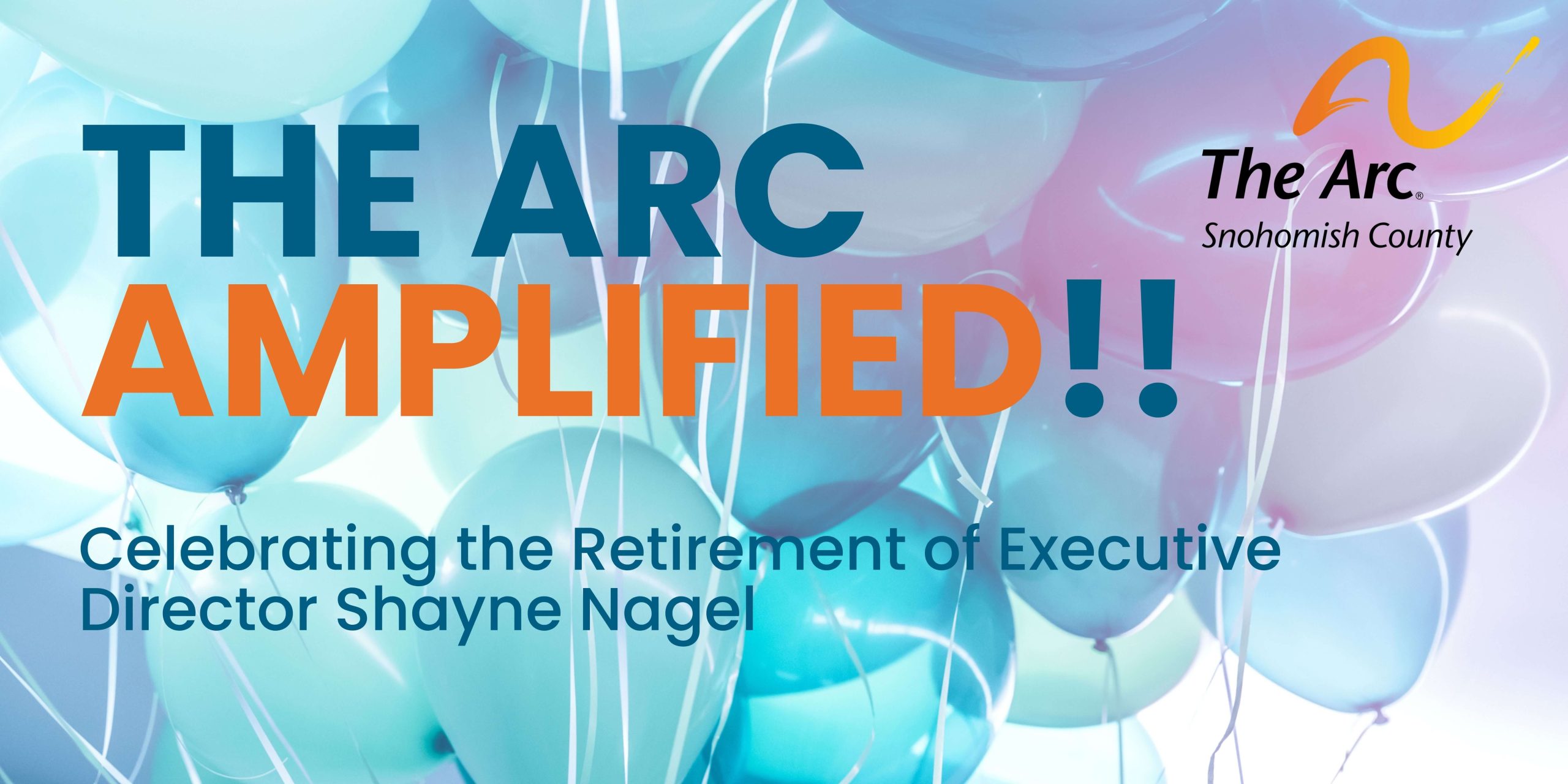
Celebrating the Retirement of Executive Director Shayne Nagel Following Years of Advocacy, Support and Leadership
On February 28th, The Arc of Snohomish County held a very special Zoom meeting for staff members to celebrate the retirement of Executive Director Shayne Nagel.
Shayne donned a special “Retirement” tiara and sash, while staff members snacked on party treats, sported some extra snazzy party specs, and tooted their party horns.
Shayne has been a part of the disability and family caregiver community in Snohomish County for many years. She has been involved with The Arc of Snohomish County for over two decades, beginning in a role as a Parent to Parent Coordinator, supporting the parents and families of children with developmental disabilities. Later, as Executive Director, Shayne led the organization through years of growth and expansion. She is a parent, a community advocate and a mentor to many past and current staff and community members. Her leadership, her guidance and her dedication to this work will be missed.
Happy retirement, Shayne!
And thank you for all the difference you made.
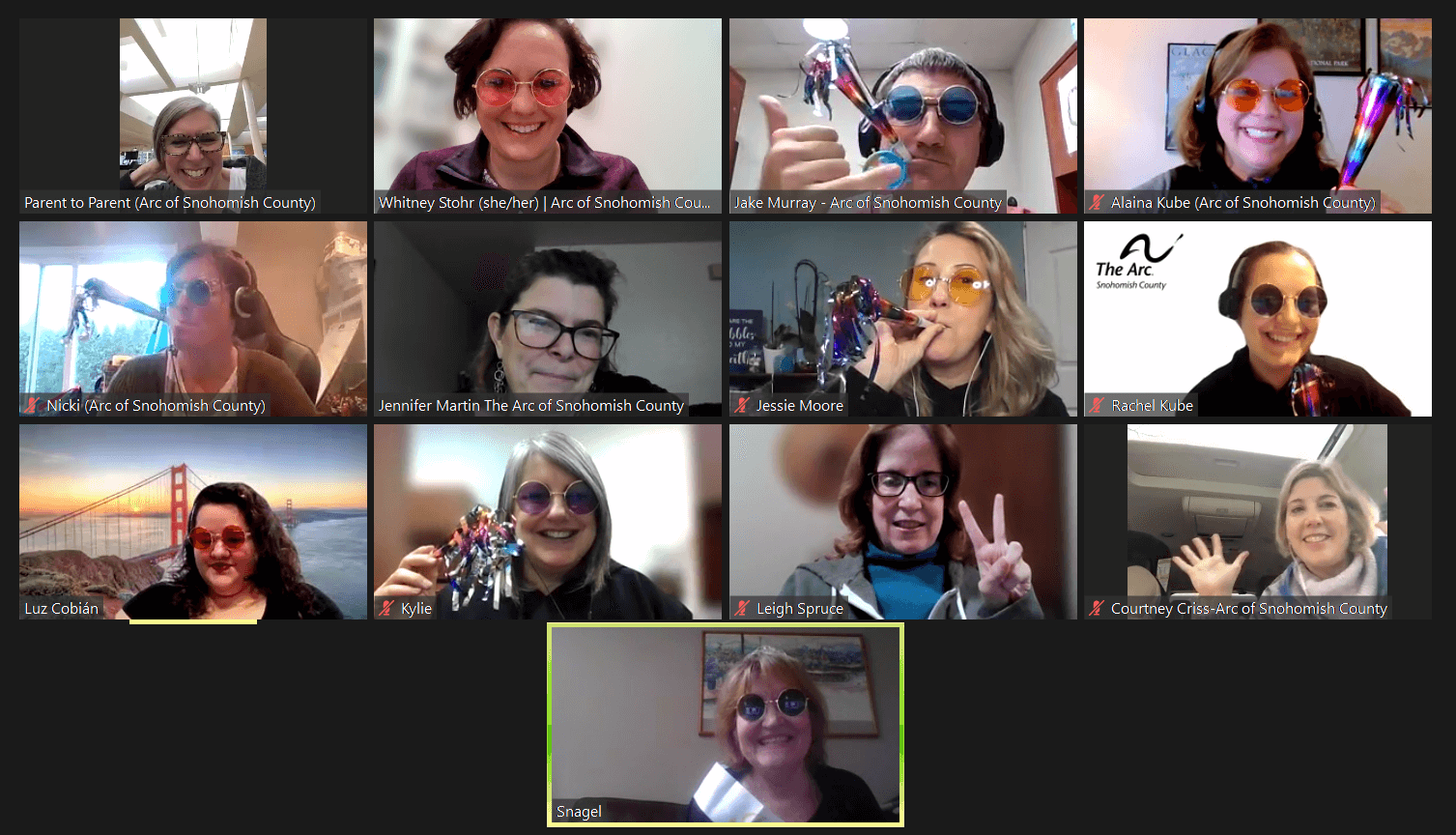
(Pictured, from Top L-R: Jamie Coonts, Executive Director; Whitney Stohr; Jake Murray; Alaina Kube; Nicki Solie; Jennifer Martin; Jessie Moore; Rachel Kube; Luz Cobián; Kylie Walsh; Leigh Spruce; Courtney Criss; Shayne Nagel, Retiring Executive Director)
U.S. Nordic Skier Erin Martin
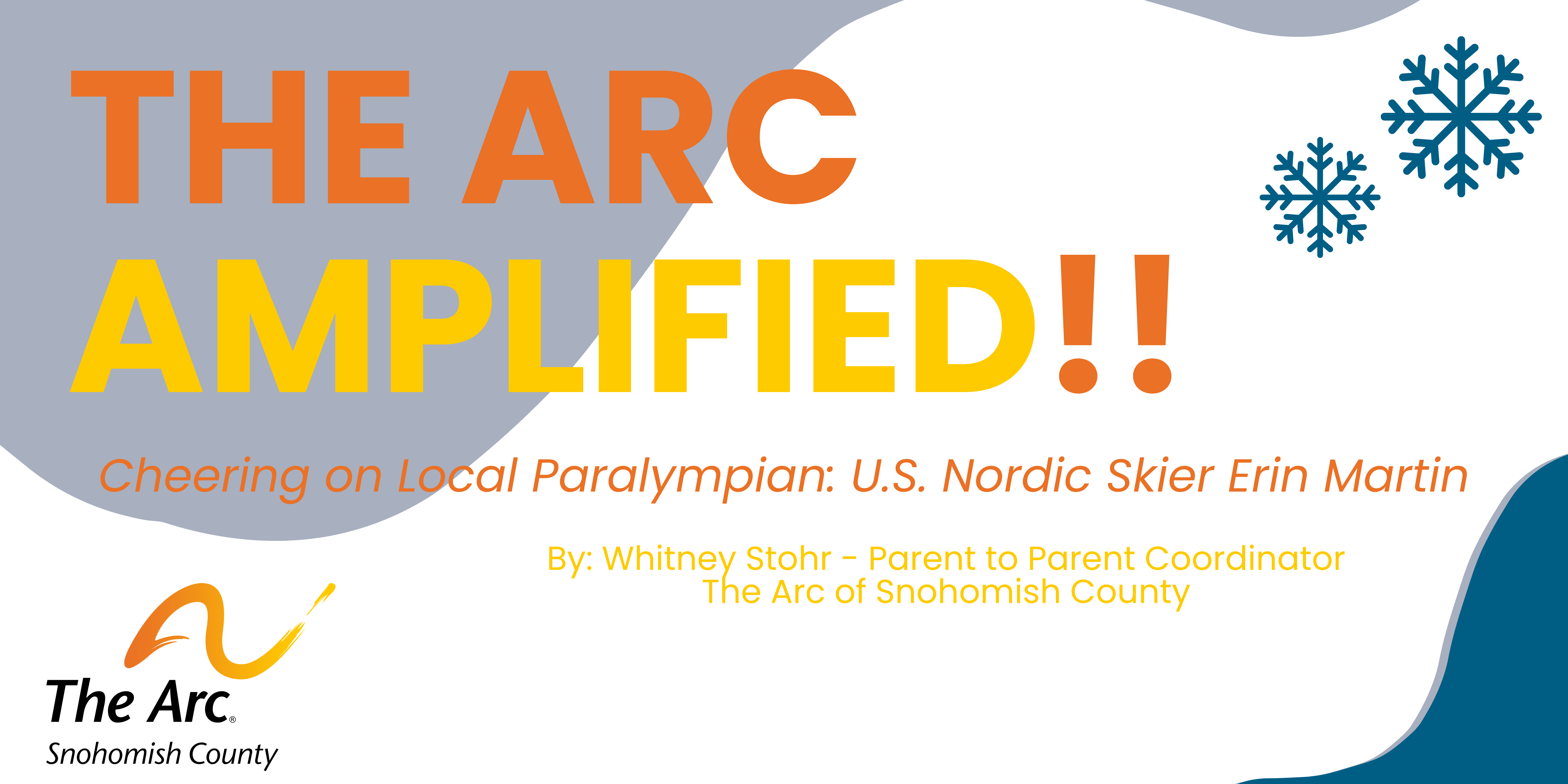
Cheering on Local Paralympian: U.S. Nordic Skier Erin Martin
Erin Martin, an internationally ranked athlete and Seattle native, will compete as part of the U.S. Women’s Nordic Skiing Team at the 2022 Paralympic Winter Games, in Beijing, China. The games will run March 4th – March 13th.

Are you ready to cheer?! Check out this video to get hyped up!
Erin Martin is a first-time Paralympian at the Winter Games in Beijing. Originally from Seattle, Erin is a Lincoln High School alum. She first tried seated Nordic skiing in 2019, and competed at the 2021 Canmore World Cup, where she placed 10th in cross-country skiing.
Erin also has another important connection to the disability community through her work at Seattle Children’s Hospital, where she works as a nurse case manager, supporting kids and families across our region.
Click here to meet the other members of the 2022 U.S. Paralympic Nordic Skiing Team.
NBCUniversal will show over 230 hours of the 2022 Paralympic Games, including 120 hours of television coverage, on NBC, Peacock, USA Network, Olympic Channel, NBCOlympics.com and the NBC Sports app. Follow along across media channels! Click here for more information about programming and schedules.
**********
Whitney Stohr is a Parent to Parent Coordinator at The Arc of Snohomish County. She is passionate about advocating for medically complex children and children with disabilities and their families. She is a mom and medical caregiver herself, who is energized by working closely with other parent/family caregivers. She lives with her four-year-old son Malachi and husband Jason in Lynnwood. Connect with her on Instagram @rollin.w.spinabifida. Contact: whitney@arcsno.org.
Show Your Stripes on Rare Disease

Show Your Stripes on Rare Disease Day, Feb. 28th
On February 28th, communities and families around the world recognize Rare Disease Day by raising awareness and advocating for issues and policies that impact the Rare Disease community.
A disease or diagnosis is considered RARE if it affects less than 1 in every 2,000 people. Around 300 million people are living with rare diseases worldwide, including 25-30 million Americans. Of over 7,000 identified rare diseases, around 70% are genetic diseases and, in the United States, some 90% lack an FDA-approved treatment option. Some rare diseases are extremely rare and have been diagnosed in only a few dozen, or even, just a handful of people.
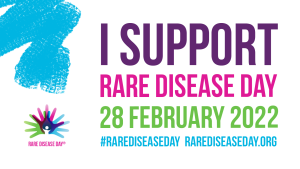
Beginning in 2008, members of the Rare community joined together to form a global movement, recognizing Rare Disease Day as a pathway to raise awareness and advocate together on issues that matter. Each year, Rare Disease Day is observed on February 28th — or, on February 29th in Leap Years, the very rarest of days. Learn more at rarediseaseday.org.
In the US, the zebra is recognized as the shared symbol of rare diseases. On Rare Disease Day, the community is encouraged to wear striped clothing and accessories to show support and solidarity for those living with rare diseases.
Want to get involved?
1. Learn more about rare diseases!
- National Organization for Rare Disorders (NORD) — org
- The Rare Disease Database — com/2uczvku4
- RareAction Network — com/3j5n6zee
- RARE Policy Issues State Report Cards — com/3mzamr3k
2. Wear stripes and raise awareness!
Show Your Stripes on February 28th in support of those in our community living with rare diseases. It is also a great way to start a conversation and educate others about rare diseases. Snap a picture to show off your stripes and post to social media with hashtags: #RareDiseaseDay and #ShowYourStripes.
3. Become an ally!
Educate yourself on the issues and policy priorities important to the Rare Disease community and sign up to receive notifications from RareAction Network about pending legislation and action alerts.
**********
Whitney Stohr is a Parent to Parent Coordinator at The Arc of Snohomish County. She is passionate about advocating for medically complex children and children with disabilities and their families. She is a mom and medical caregiver herself, who is energized by working closely with other parent/family caregivers. She lives with her four-year-old son Malachi and husband Jason in Lynnwood. Connect with her on Instagram @rollin.w.spinabifida. Contact: whitney@arcsno.org.
Creating a Self-Care Strategy in THREE Steps!
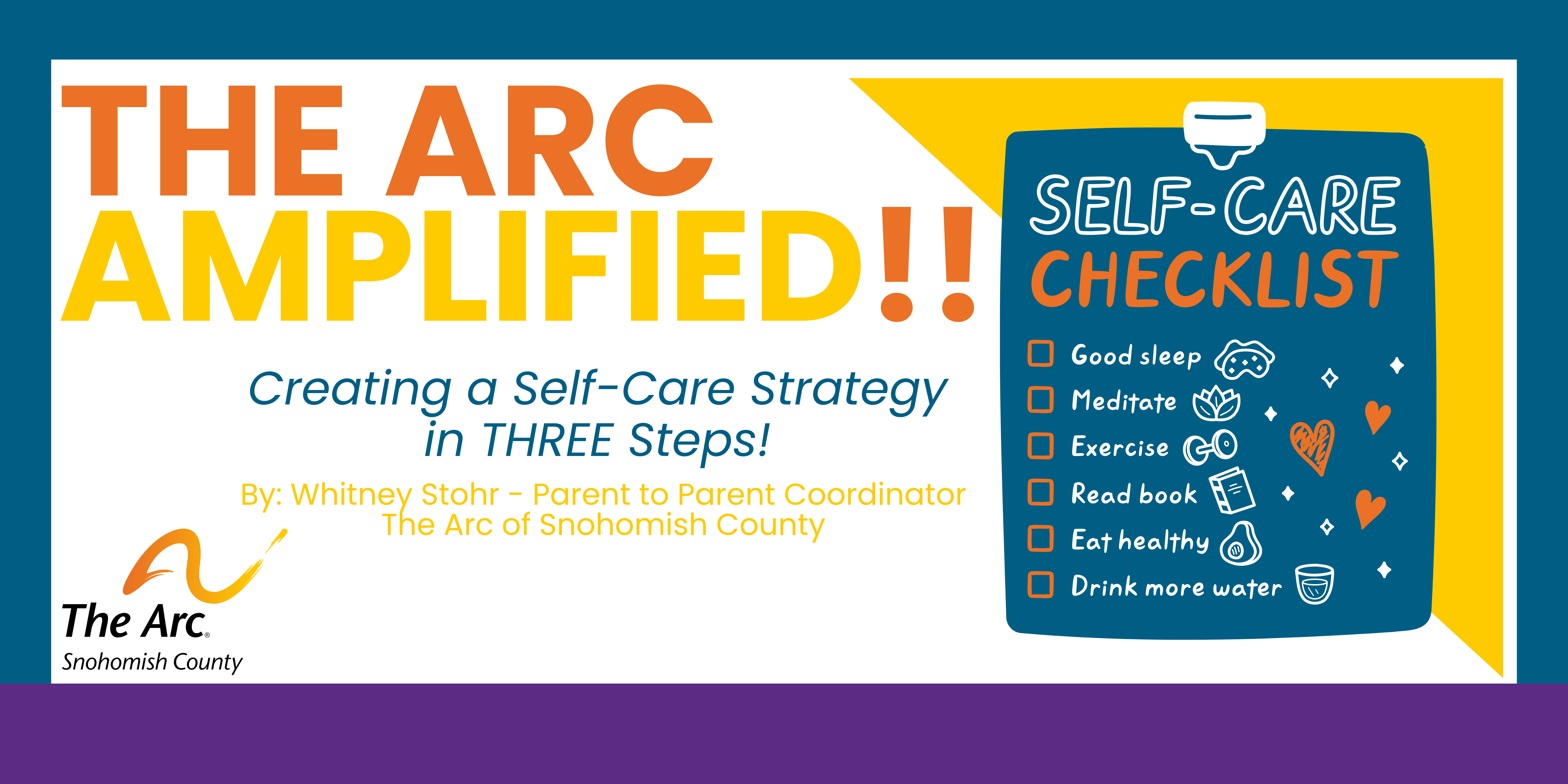
Creating a Self-Care Strategy in THREE Steps!
The buzz about “self-care” is everywhere!
It is difficult these days to access any social media platform without scrolling across one or two (or three or four…) mentions of self-care. Whether it is a friend sharing about her recent re-commitment to self-care following a particularly busy period of family changes (good for her!) or a news site sharing an article by a well-known expert in personal wellness, the reminders abound that self-care, despite its current buzz-worthiness, is both important and necessary for all of us.
That factor of necessity perhaps garners even greater truth when applied to the role of parenting. The day-to-day requirements of running a household, working and caring for young children and other family members rapidly absorbs whatever time you could possibly hope to find for a moment alone. Then you add in the medical, nursing, therapy and other responsibilities tied to the role of caregiving for a child with a disability, and… forget about it!
Self-care is often the very last thing on our minds as family caregivers of children with disabilities and complex medical needs. You get going, going, going and — all of a sudden — it is already 9 PM and you have no idea where the day went.
And yet… self-care remains as important for family caregivers as anyone else.
(I would argue that self-care is actually far more important for family caregivers than the general population based on research showing the heightened health risks and overall wellness challenges resulting from caregiving.)
And yet, still… it remains so hard to fit into your day. You know it is important. You want to focus on self-care and all the things that bring you joy, and your passions and your interests and your hobbies…. but, you have SO MUCH to get done! Every day.
I get it. As a family caregiver, this is a mental battle I fight with myself — Every. Single. Day. And then, I read another study about the impacts of caregiving on family caregivers, and it serves as another reminder that we MUST take care of ourselves. We MUST!
But, how?
If we think of self-care in terms of moments that bring us joy, however brief, and activities that lift our spirits, however simple, then the practice of self-care transforms into something attainable. If we give ourselves grace and view self-care as a practice that can grow with us through the years of caregiving, then we might learn to view self-care as a lifestyle, rather than an item to check off our daily to-do list.
Here are THREE STEPS to help you create a self-care strategy that works for you:
Step 1: Create a list of activities, interests and items that bring you joy. Begin by free-writing. Jot down whatever pops into your head. Consider activities or hobbies you love. What brings a smile to your face? Is it art, music, dancing, running or working with your hands? Do you like to read? What does “pampering” look like for you? Remember to include places and activities you enjoy outside the house. Add your favorite local hangouts to the list. Do you have a favorite coffee shop or bakery? Does a trip to the library renew your spirit? Is it swimming laps at the local aquatic center or volunteering at a nearby dog shelter? Write it down — whatever it is, no matter how big or small.
Step Two: Incorporate moments of joy into your day. Review your list and brainstorm where opportunities exist throughout your day to incorporate these activities to create moments of joy. This is self-care. Focus on the small things that can be easily integrated into your daily life. Ask yourself: What small changes can I make that will easily become self-care habits? Doing this will make self-care a *part* of your day, rather than something that must be done *in addition* to your day.
Step Three: Set achievable self-care goals. Now, consider longer term goals. Ask yourself: What would it take for my soul to feel fulfilled? Consider those items on your list that lend themselves to long-term practice, and create for yourself goals that, while achievable, may require additional planning and effort beyond your daily responsibilities. These are goals to work toward. It may take a while to fold them into your routine and that is completely expected. These are goals that can drive you and encourage you along your journey in personal self-care.
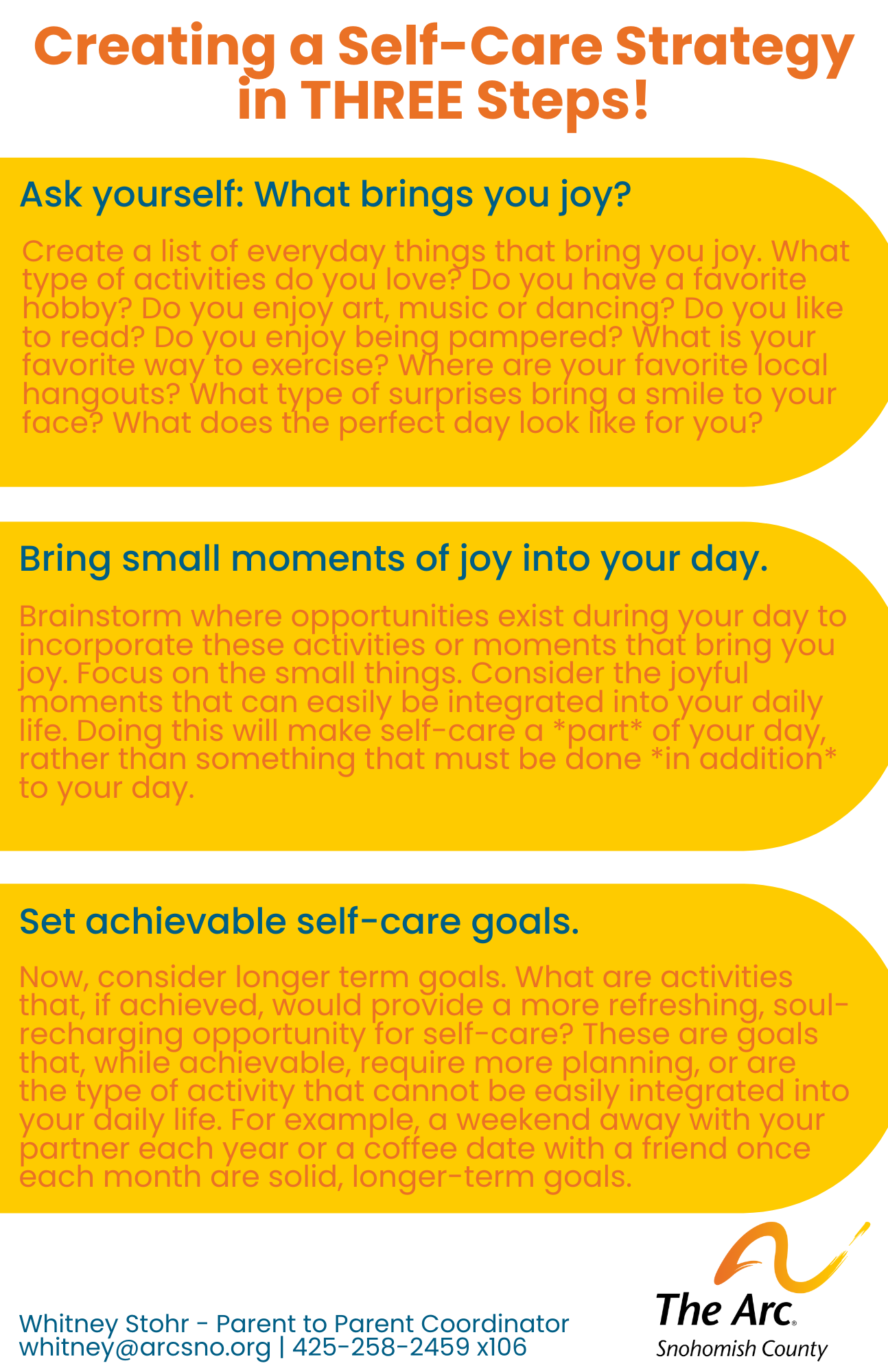
Note: This three-step strategy to conceptualize and develop a self-care routine was first presented at the “Caregiver Connections” support group meeting on February 15th, 2022. Caregiver Connections is a monthly, self-care centered support group for parents and family caregivers of children with disabilities. The group meets on the 3rd Tuesday of each month at 7 pm. For more information or to register, visit The Arc of Snohomish County event calendar online at arcsno.org/calendar.
Are you interested in creating a more in-depth self-care plan as a family caregiver? The Family Caregiver Alliance offers some great strategies in this article: tinyurl.com/37dnedbd.
**********
Whitney Stohr is a Parent to Parent Coordinator at The Arc of Snohomish County. She is passionate about advocating for medically complex children and children with disabilities and their families. She is a mom and medical caregiver herself, who is energized by working closely with other parent/family caregivers. She lives with her four-year-old son Malachi and husband Jason in Lynnwood. Connect with her on Instagram @rollin.w.spinabifida. Contact: whitney@arcsno.org.
Recognizing Erica Knapp

Celebrating Parent Recognition Month — February 2022
Recognizing Erica Knapp, a Community Advocate and Mom of Three
In Washington state, the month of February is celebrated as Parent Recognition Month by Seattle’s Child magazine and the Washington State Department of Children, Youth and Families (DCYF) under proclamation of Governor Jay Inslee.
Each year, twenty-eight parents and caregivers across the state are recognized for the outstanding role they play in their families, schools and communities.
Congratulations to Erica Knapp, a Snohomish County parent caregiver, community advocate and a 2022 Unsung Hero. Erica lives in Arlington with her husband and three children.
Erica was nominated for the role she plays as a local leader and advocate for equity, diversity and inclusion. As the parent of a child with a developmental disability, Erica serves as a member of her local School Board and helped launch a parent group to provide resources and information to other families of kids with disabilities.
Another example of Erica’s community involvement from the award nomination page: “This winter Erica partnered with the city of Arlington to offer ‘sensory-friendly’ opportunities for kids with sensory sensitivities to enjoy the seasonal carousel without music and with shorter wait times. The outpouring of appreciation from parents demonstrated the need for this in the community.” Amazing work, Erica!
Read more on the Seattle’s Child website.
